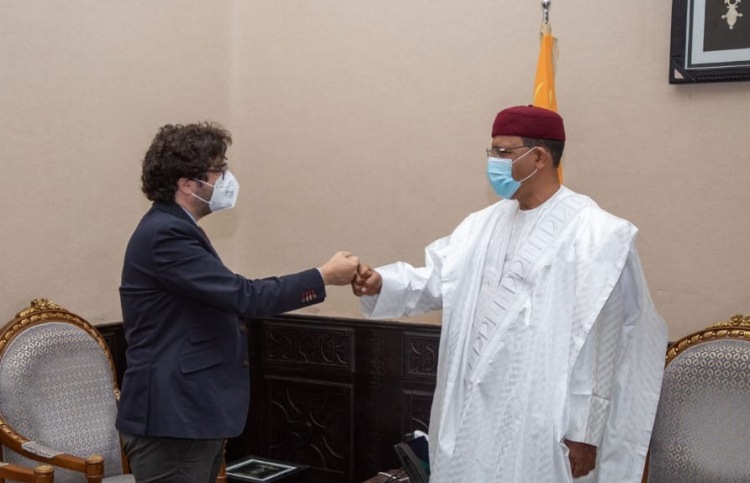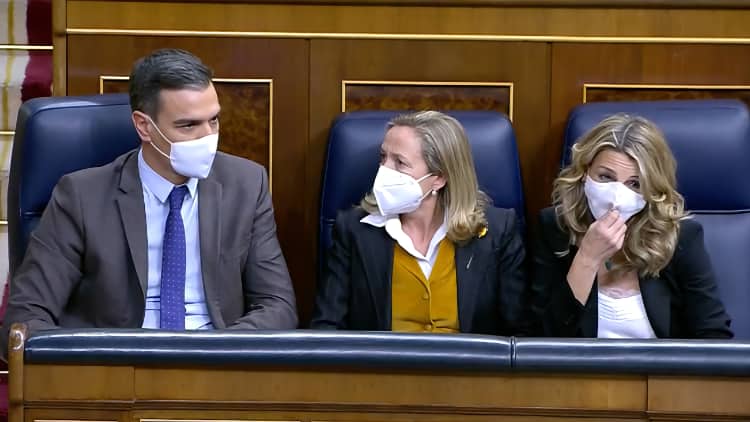The Diplomat
The director of the Spanish Agency for International Development Cooperation (AECID), Antón Leis, made past week in Niger his first trip to a country on the African continent since his appointment in July 2021.
In his last public act in Niger, held on Wednesday, Leis handed over to the authorities health equipment to facilitate the training of medical specialists in the country, within the framework of the Specialized Medical Training Program that AECID carries out together with the State Foundation, Health, Childhood and Social Welfare (FCSAI) in various African countries -Mauritania, Mali, Ethiopia and Mozambique- and Bolivia.
Antón Leis was also received by the President of the Republic, Mohamed Bazoum, with whom he discussed the complex context of the region, and by the Prime Minister, Mahamadou Ouhoumoudou, with whom he discussed the development situation of the Nigerien population and Spain’s cooperation projects in Niger.
In another highlight of the trip, Leis co-chaired, together with the director of World Bank operations in the Sahel, a meeting of the members of the Sahel Alliance, where he presented the priorities of the Spanish presidency of the General Assembly of this organization, with special focus on youth and education and the obstacle posed by the closure of schools due to the intensification of terrorist attacks.
Antón Leis was also able to see on the ground various cooperation projects promoted by AECID, such as the improvement of food and nutritional security carried out by the NGDO Conemund in villages near the capital, Niamey, or the initiatives of the Association of Women Jurists of Niger (AFJN), which defends the rights of women through their legal protection, but also with specific centers for women victims of violence deployed throughout the country.
Leis also held a meeting with representatives of Spanish NGDOs in the country, as well as with representatives of international organizations involved in humanitarian action initiatives to which Spain also contributes, such as the United Nations agencies focused on shelter -UNHCR- and children -UNICEF-, the World Food Program (WFP) and the UN Office for the Coordination of Humanitarian Affairs (OCHA); as well as the International Committee of the Red Cross (ICRC).
Niger is a priority country for Spanish Cooperation, which focuses its initiatives on health, gender, rural development and food security in the urban area of Niamey and the regions of Tahoua and Maradi. In addition, Niger is listed as a country of special attention in the Spanish Humanitarian Action strategy for the Sahel and the Lake Chad crisis due to its status as a transit country for migratory movements to North Africa and as a host country (resettlement of migrants and refugees).
The country is, since 2018, in the last position (rank 189) of the Human Development Index (HDI), published annually by the United Nations Development Program (UNDP). With a life expectancy of 62.4 years, the Nigerian population has an expected average schooling of only 6.5 years. 74.8% of the population lives in extreme poverty and there is a significant gender gap that translates into an HDI disparity: 0.321 for women and 0.443 for men.
According to UNHCR, the countries in the central Sahel region – Burkina Faso, Mali and Niger – are at the epicenter of one of the world’s fastest growing humanitarian displacement and protection crises. More than 900,000 refugees and nearly 2.5 million internally displaced persons are in this region, according to the UN Refugee Agency.







